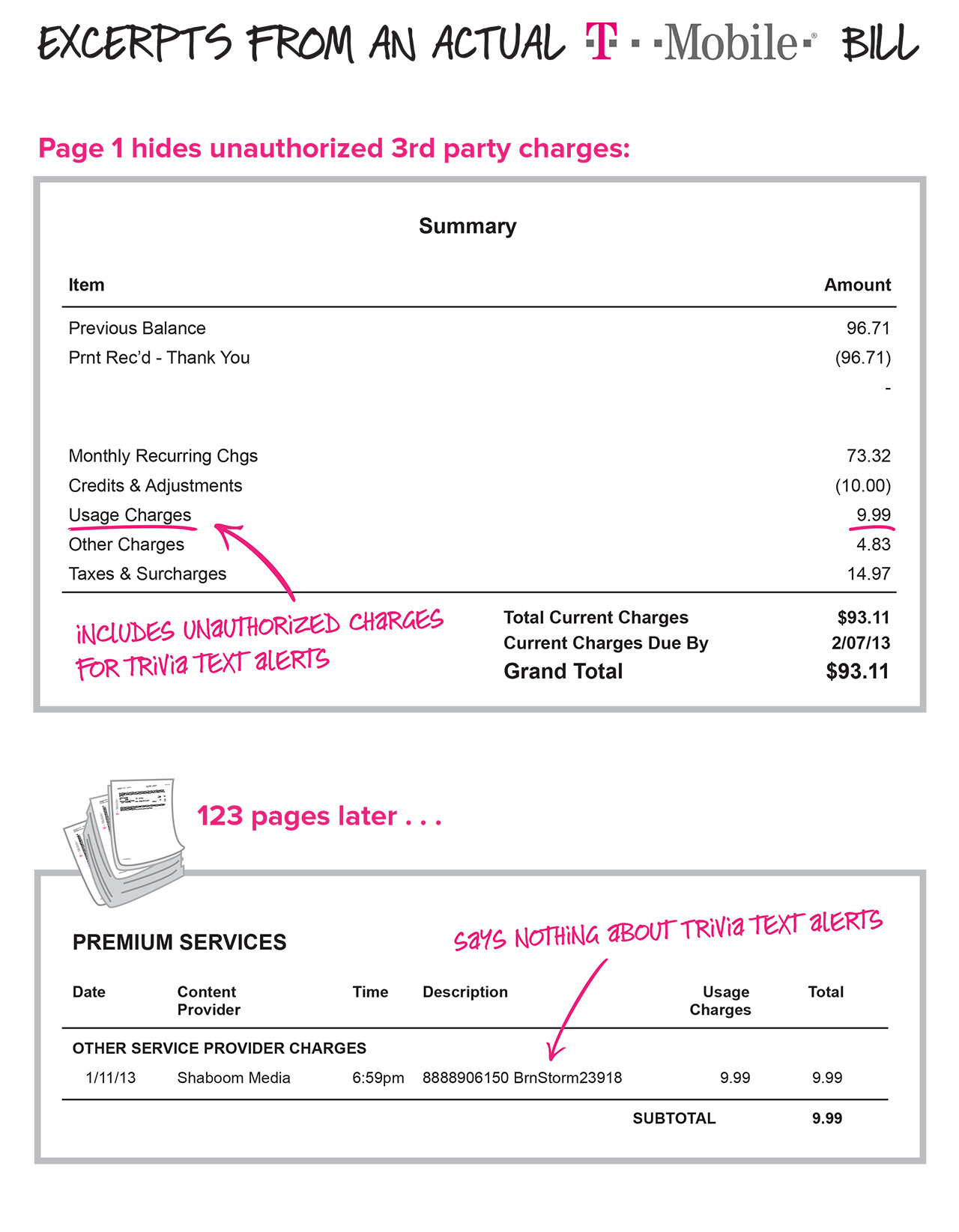
Government watchdogs on Tuesday charged T-Mobile with making hundreds of millions of dollars by turning a blind eye to a text message scam scheme known as “cramming.” Here’s what you should know about it:
What is cramming?
Cramming happens when scammers attach hard-to-spot charges to text message services like horoscopes or trivia games. Those charges either come without your permission or at a higher rate than you expected. The fees are attached to your monthly phone bill, and your carrier often takes a cut, as it would for other forms of third-party billing-by-text. The crammers hope their charges stay hidden in plain sight on your often-confusing monthly phone bill.
Here’s what a cramming charge would look like on a T-Mobile bill, according to the FTC:

Is cramming legal?
Some states have passed anti-cramming laws, but monitoring for and responding to cramming schemes is largely the job of the FTC, the nation’s federal consumer watchdog, and the Federal Communications Commission, which oversees wireless carriers and other telecoms.
The FTC has been successful in clamping down on cramming before: a group of companies which the Commission said were running a massive cramming scheme recently settled those charges to the tune of $10 million. The FCC, meanwhile, says it’s penalized companies nine times for cramming — and will look at the FTC’s T-Mobile charges as well. And Verizon agreed last year to settle a class-action cramming lawsuit, agreeing to refund every single cramming charge to any customer who asked for his or her money back in a big win for consumers.
Should I be worried about cramming?
At this point, not really. Not long after that Verizon settlement — and under pressure from state attorneys general — the four major American carriers — Big Red plus AT&T, Sprint and T-Mobile, agreed to drop most forms of third-party text billing. That effectively eliminated text message cramming as a worthwhile scam, so it’s not happening so much anymore. The carriers still let you make some payments via text, like to the Red Cross during emergencies and, more recently, to political campaigns.
But if you think you’ve been crammed, you can complain to your carrier and to the FTC to get the ball rolling on a refund — an option available to you even before the carriers’ pact. You can also contact the FTC about pretty much anything else confusing about your phone bill.
But wait, I thought the FTC said T-Mobile was allowing cramming?
You’re right! But the FTC’s accusing T-Mobile of allowing cramming back before the carriers made their pact against the practice. The Commission’s saying that so many T-Mobile customers were requesting refunds for certain third-party charges, it should have been clear to T-Mobile that something fishy was going on — but according to the FTC, T-Mobile didn’t act on those red flags. Instead, the FTC says, T-Mobile made millions by taking 30-40% of the obviously fraudulent charges.
What’s all this mean for T-Mobile?
T-Mobile is in hot water here. Under the leadership of feisty and controversial CEO John Legere, T-Mobile’s branded itself as the “un-carrier,” a hip wireless carrier that’s more consumer-friendly than rivals Verizon, AT&T and Sprint. Getting hit with a charge like this could put a serious dent in that image, as my colleague Victor Luckerson writes: What’s consumer-friendly about reaping millions off text message scams? Legere himself has already responded to the FTC’s charges, calling them “factually and legally unfounded” and “misdirected.” Legere also says T-Mobile’s been working to refund cramming fees.
The cramming charges could also throw a monkey wrench into Sprint’s plans to merge with T-Mobile in a massive $32 billion deal that has yet to pass regulators’ smell tests — it’s likely the charges will need to be addressed before that deal can be given the green light.
More Must-Reads from TIME
- How the Economy is Doing in the Swing States
- Democrats Believe This Might Be An Abortion Election
- Our Guide to Voting in the 2024 Election
- Mel Robbins Will Make You Do It
- Why Vinegar Is So Good for You
- You Don’t Have to Dread the End of Daylight Saving
- The 20 Best Halloween TV Episodes of All Time
- Meet TIME's Newest Class of Next Generation Leaders
Contact us at letters@time.com